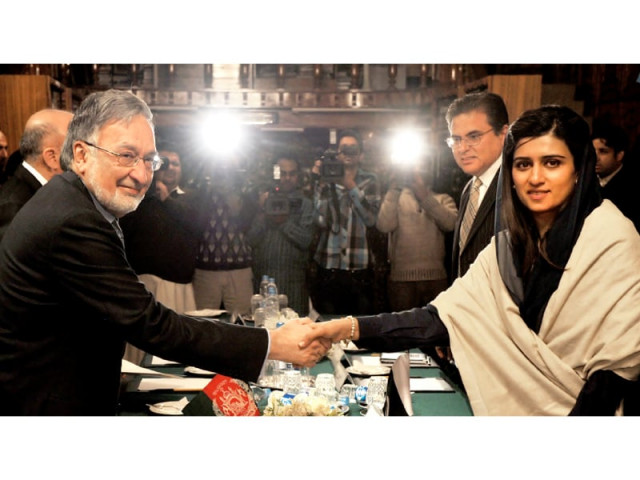Afghan peace process: Pakistan agrees to free more Taliban prisoners
Joint Ulema conference in January; formal talks on strategic pact begin.

Pakistan has agreed to release another batch of Taliban prisoners in a bid to facilitate the nascent peace process in war-torn Afghanistan.
The announcement was made following talks between Afghan Foreign Minister Dr Zalmai Rassoul and his Pakistani counterpart Hina Rabbani Khar on Friday. Rassoul also met with Prime Minister Raja Pervaiz Ashraf and Army chief Gen Ashfaq Parvez Kayani on Friday.
It was the second high-powered Afghan delegation to visit Islamabad this month to press for the release of Taliban inmates. Earlier this month, talks between Pakistani officials and the Afghan High Peace Council resulted in the release of nine mid-level Taliban cadres.
A joint statement issued after Friday’s talks did not specify the number of Taliban prisoners to be released. However, a senior security official said former Taliban No 2 Mullah Abdul Ghani Baradar was not among them.
“This is a very delicate process and we need a step-by-step approach to deal with this issue,” the official told The Express Tribune.
Appearing at a news conference with his Pakistani counterpart, the Afghan foreign minister demanded the release of all Taliban prisoners who could help bring the militants to the negotiating table.
“We want all Afghan Taliban to return to their country, join the constitutional political process there and play their part in furthering the construction and development of our nation,” said Rassoul.
According to diplomatic sources, the Afghan side appreciated the earlier release of mid-ranking Taliban cadres, but wanted to see an early return of Mullah Baradar who, they believe, could invigorate the fledgling peace process.
Mullah Baradar was arrested from Karachi in 2010. At the time of his arrest, he was reportedly engaged in talks with US and Afghan government officials to broker a peace deal.
Foreign Minister Khar told reporters that the issue of Afghan prisoners was discussed “thoroughly [at the talks], and I’m quite sure that we would all agree that we are making forward movement.”
She disclosed that the two sides had agreed to revive a joint commission formed last year to address the issue of prisoners.
While Islamabad and Kabul attempted to resurrect the peace talks, they also agreed to hold a joint conference of religious scholars in Kabul in January next year. The proposed “Ulema Conference” would help evolve a consensus among different schools of thought against the Taliban ideology.

The conference would issue a fatwa (religious decree) declaring suicide attacks un-Islamic, a senior Pakistani official told The Express Tribune.
Zalmai Rassoul’s visit also marked the start of formal negotiations between the two neighbours to finalise a long-term strategic partnership agreement.
Khar said Pakistan shared a draft proposal on the strategic pact with the Afghan side. She hoped the two countries would conclude the deal at the earliest. “We hope that, as we start this journey today, this will contribute to stronger bilateral track between the two countries.”
The proposed strategic pact, one official pointed out, would lead to increased security and intelligence cooperation between the two neighbours.
The two sides also discussed the issue of cross-border incursions and shelling and agreed to have an institutionalised mechanism to address this issue.
While expressing satisfaction at the current volume of annual bilateral trade ($2.5 billion), the two countries agreed to take facilitative steps to achieve the target of $5 billion annual trade by 2015.
Recognising the need for jointly pursuing trade and transit agreements with Central Asian states, the statement said the two sides agreed that as a first step a trilateral transit and trade agreement will be negotiated with Tajikistan, to be extended to other countries as appropriate and mutually determined.
Both countries agreed to work together for phased, dignified and voluntary return of Afghan refugees and stressed the need for creating “pull factors” for this purpose. Afghanistan thanked Pakistan for hosting the largest number of refugees in the world for more than three decades.
Published in The Express Tribune, December 1st, 2012.



















COMMENTS
Comments are moderated and generally will be posted if they are on-topic and not abusive.
For more information, please see our Comments FAQ